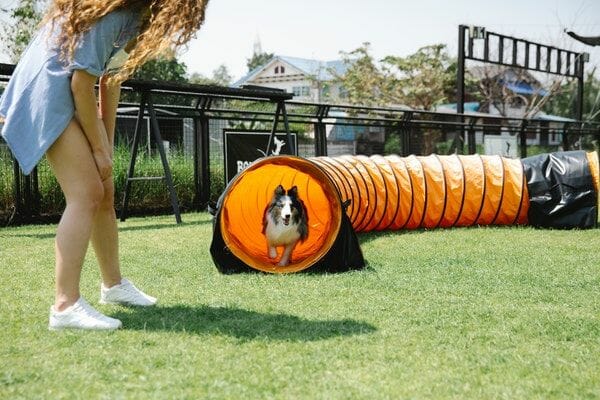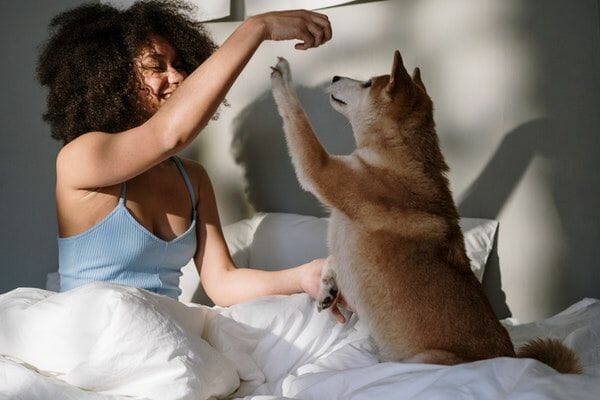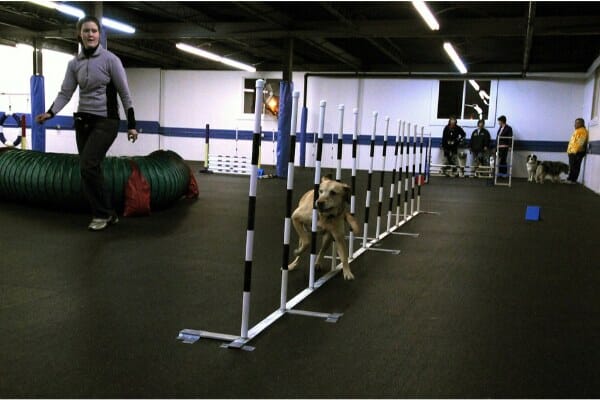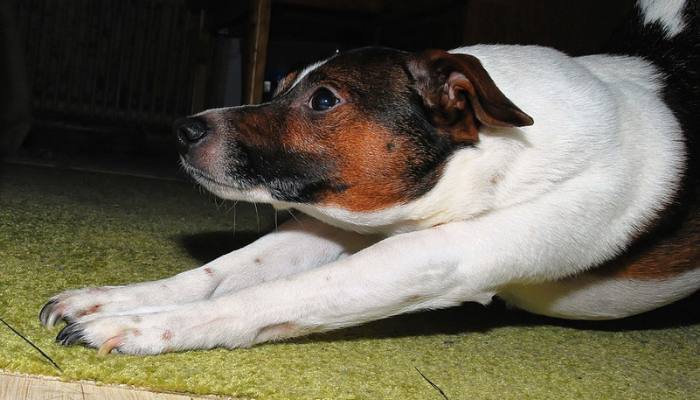How to Stop a Puppy from Barking
Puppies yelp – it’s what they do. Move them away from their mom and familiar surroundings, and they’ll get jittery, lonely, and a tad bit frightened.
How does a puppy communicate these feelings? It barks!
Dog barks are the canine’s way of communicating emotions, the way we would through our words. Not all types of barking are to be discouraged. You don’t want to hinder your dog from expressing emotions.
However, there are some types of puppy barks that need to be stopped.
Let’s start by identifying why pups bark and then move on to some tips on how to make the transition for your new puppy as easy as possible.
Table of Contents
Why Do Dogs Bark?

As said, barking is communicative for most dogs. It could be reactive barking when a puppy is barking in reaction to a stimulus. Territorial barking is also responding to triggers such as other dogs or people that may wander onto or past your property.
Some dog owners don’t mind the territorial barking, but it gets to be a problem when your puppy starts to bark at anyone and anything.
Your dog could also be scared, anxious, excited, or even sick. Separation anxiety barking is a common dog behavior for dogs who are overly attached to their owners (Velcro dogs) or ones that are not very independent.
This type of barking can happen with any breed, but there are some that are more susceptible, especially the working-type breeds that work in a pack.
If you notice a sudden change in behavior and your dog’s barking has become more erratic, then it’s possible that your pooch may be sick or in pain. If you notice other symptoms accompanying the abnormal barking such as a lack of appetite or lethargy, then schedule a vet visit to be sure.
Lastly, barking behavior can happen during crate training, and there really is no way around that other than time, patience, and consistency.
How Do I Treat Excessive Barking?

As said, it takes time, patience, and consistency to treat excessive barking. As long as you understand that it will not happen overnight and requires constant implementation of the proper techniques, then puppy training that leads to a fully crate-trained pup will be easier than you think.
Preparing your puppy-friendly crate
One of the secrets to crate training is preparing a puppy-friendly crate, one that’s filled with all of his favorite things such as chew toys, comfy padding, maybe a blanket, and even a crate cover if that’s what your pup prefers.
The crate should also be the right size in order to prevent accidents. If you go for a dog crate that’s too large, your dog can easily eliminate in one corner and lay comfortably out of the way on the other end.
A crate that is too small will impact your dog’s development and comfort. The right-sized crate is one that allows your dog to stand up and turn around comfortably, maybe take one or two steps, and lay down again.
Crate Training During the Day

When you’re crate training during the day or when you leave the house for work, it’s important to try and reduce separation anxiety. You can do so by training your puppy for short periods. Put your pup in the crate for a few seconds, and lengthen the time as he starts getting used to it and doesn’t bark. If the dog barks in a crate, there are some ways to manage it. Remember to reward your pup generously with his favorite treats when he is quiet.
What should I do if my dog starts barking in the cage?
Never reward your dog with attention when he is barking or crying in the crate. We also suggest taking your pup to potty before placing him in the crate so you know he’s not crying for a bathroom break.
You can leave something such as a piece of clothing with your scent on it or other calming devices that can ease your puppy’s anxiety inside the crate.
Only give your pup attention when he is quiet. You can set bark training back if you reward your pooch for the behavior by either letting him out or giving him the time of day. This is especially true at night.
Take your dog to potty before bedtime and only let him out for one or two potty breaks during the night. Ignore your dog’s barking at all other times.
Why you should never punish your dog for barking in the cage?

Punishing your dog for barking in the crate will create a negative association between the pup and the rate. The more this happens, the less likely your pup will accept the crate and it will make training sessions even more difficult.
This is why we strongly suggest positive reinforcement. Positive training techniques require patience, consistency, and proper timing. Only give your dog rewards when he is quiet.
Your dog may be yapping away for hours on end, but there will always be a small pocket of time somewhere during that period when you can take advantage of it and toss your dog a treat. You should also say encouraging works in an exciting tone to let your pup know you’re pleased.
Desensitize your dog to the stimulus
When you figure out what causes your dog to bark, you can try to desensitize him to the trigger with overexposure. A reactive dog or a poorly socialized one may always bark in response to new things and new stimuli.
If this is the case, then make sure your dog has as many chances as possible to interact with the trigger. Once the novelty wears off, your dog will no longer bark at the stimulus.
Keep your dog tired

A tired dog is a good dog. Dogs require sufficient physical and mental exercise every day to expel extra energy. Physical exercise is activities such as playtime and daily walks. For mental stimulation, we’re looking at training sessions where you teach your dog new tricks or commands, and puzzle and food-dispensing toys are also great at working your dog’s brain.
Sometimes, something simple such as a peanut butter stuffed Kong toy works very well as a mental stimulus. A tired dog is one that’s less likely to bark and it also helps with crate training, separation anxiousness, and nighttime crating.
Ignore the barking
We said that barking should be ignored if you have already met all of your dog’s needs. Attention and boredom barking should also definitely be ignored. The best way to treat barking that should not be rewarded is with mental and physical exercise.
Help for Sleep-Deprived Parents

Aside from making sure your dog has gone to the bathroom, is properly fed, and has had enough stimulation, one more trick that can make crating at night easier for sleep-deprived parents is to establish a routine.
Puppies are very adaptable creatures and they conform to your schedule. Keep to a routine as closely as possible each day. Some puppies will learn what to expect at night and understand that it is sleep time and eventually stop barking.
You can also choose to use relaxing devices that can also reduce barking such as calming scents, weighted blankets, and ticker toys.
Contact a Certified Professional Dog Trainer

If nothing works or if you suspect your puppy’s barking is a sign of aggression, then we suggest contacting a certified professional dog trainer. Experts are excellent consultants for problem behaviors such as nuisance barking.
Frequently Asked Questions
How do you make a puppy stop barking?
You can make a puppy stop barking by identifying the reason why and then treating the problem with a corresponding method. Remember to never reward unwanted behavior with your attention.
Do puppies grow out of barking?
Some puppies grow out of barking while others do not. The best way to ensure your dog will eventually stop barking is with training.
Why does my puppy bark so much?
There are a variety of reasons why your puppy barks so much. Your pup could be ill, bored, afraid, or territorial, suffer from separation anxiety, or could be understimulated.
Conclusion
Puppy barking is inevitable, but with the proper training methods accompanied by patience, consistency, and positive reinforcement, the problem can be treated.
We Think You’ll Like:
10 Best Ultrasonic Dog Bark Control Devices in 2022







